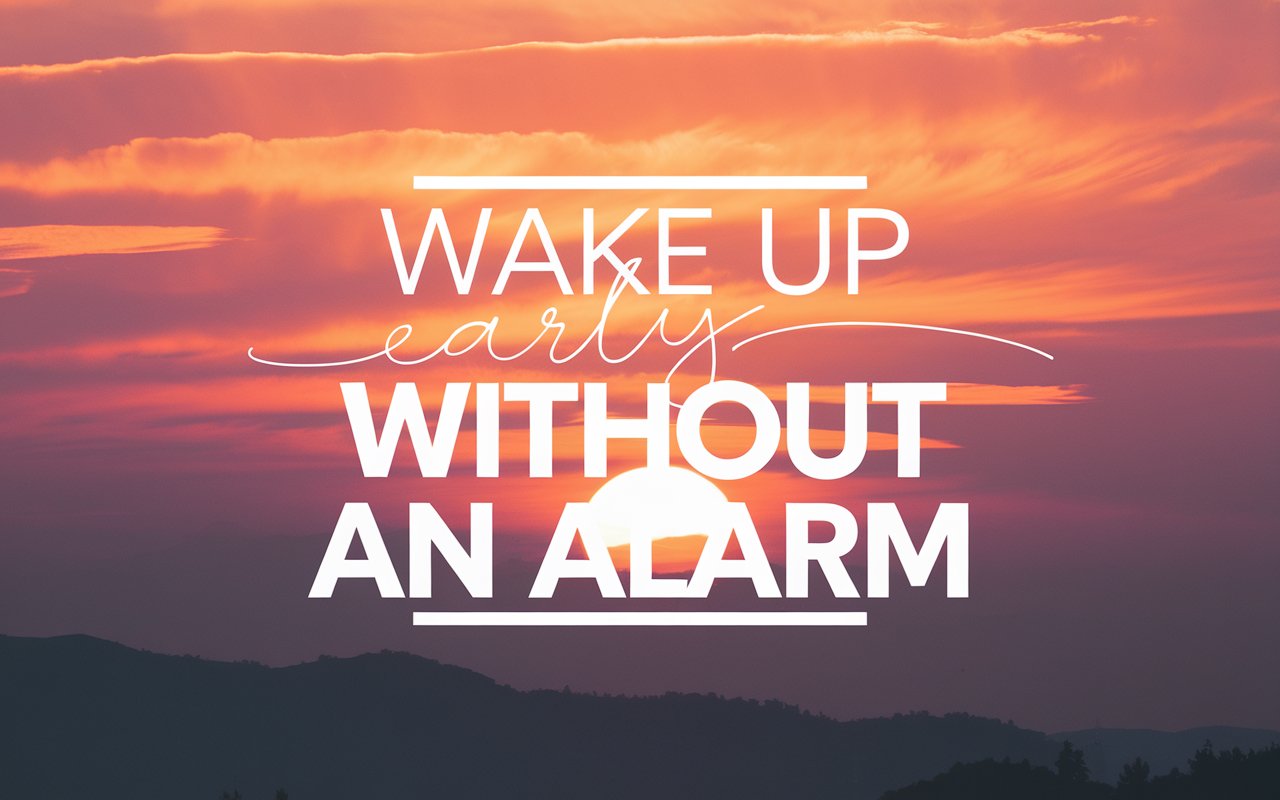Waking up without an alarm may sound impossible for some, but it’s a natural and peaceful way to start your day. I used to be the type of person who relied on loud alarms every morning.
I’d hit the snooze button again and again, and my mornings felt rushed and stressful. But, I decided to challenge myself and learn how to wake up early naturally.
Let me tell you, it’s been life-changing! I wake up refreshed, have more morning energy, and feel like an early riser ready to tackle the day.
But how can you make this happen for yourself? It takes time, and you must make some adjustments to your routine, but it is achievable.
Once you stop depending on an alarm clock, your body can sync with its natural rhythm, improving both your sleep and energy levels.
Read More About Productivity Hacks
Depending on Alarm Clocks Can Mean Your Sleep Quality Is Lacking
If you’re hitting snooze every morning, it’s a clear sign that your body isn’t rested. I used to rely heavily on my alarm clock, thinking it was the only way I’d ever get up in time.
But what I didn’t realize was that relying on an alarm meant I wasn’t getting quality sleep.
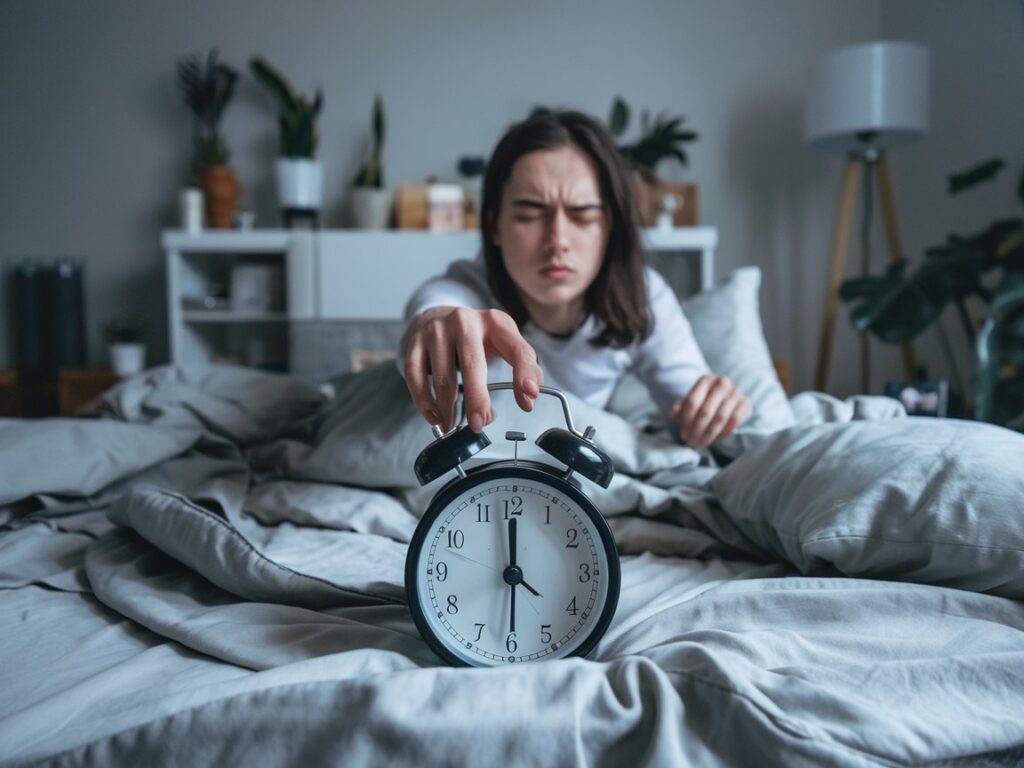
Alarms jolt you awake, pulling you out of deep sleep, which can make you feel groggy. This grogginess often leads to poor concentration, low energy, and feeling grumpy in the mornings.
Your sleep cycle needs time to finish, but an alarm doesn’t care. It just interrupts whatever stage of sleep you’re in, and that leaves you feeling less rested.
By waking up early naturally, you’re giving your body the chance to complete its sleep cycle. When your body gets the rest it needs, you can wake up feeling refreshed and ready for the day ahead.
That’s why it’s worth exploring how to wake up without an alarm.
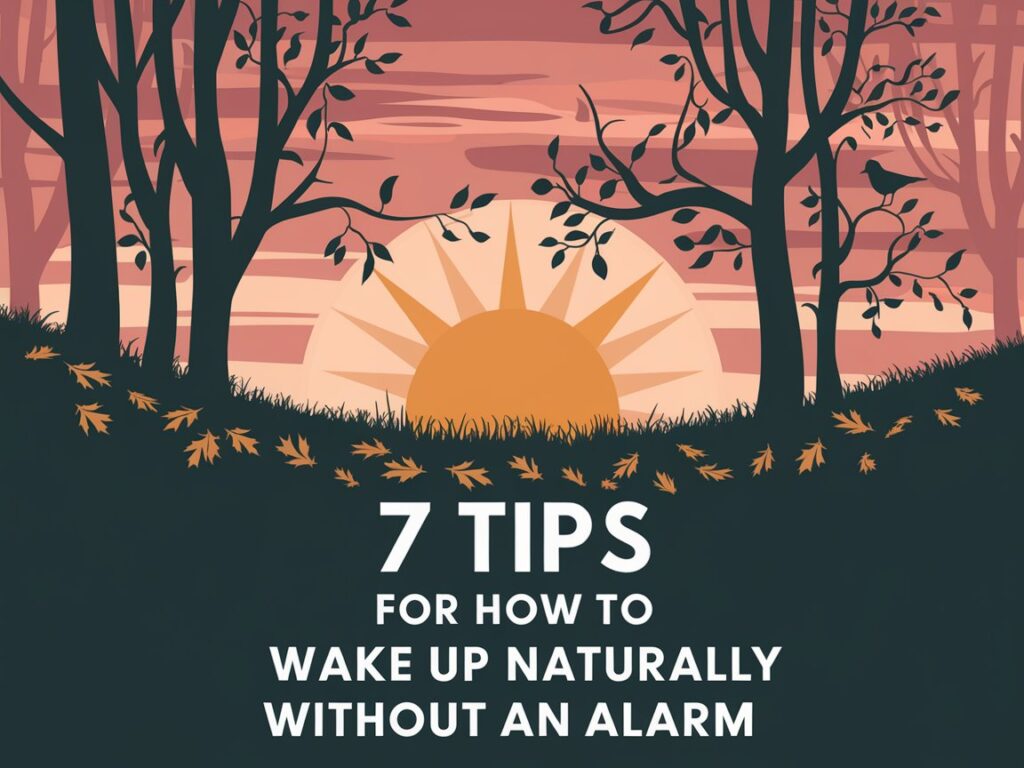
7 Tips for How to Wake Up Naturally Without an Alarm
Learning how to wake up early naturally is not a one-size-fits-all process. There are several ways to retrain your body to wake up without the harsh buzz of an alarm.
It may take some time to get used to, but if you stick to these tips, your body will adapt, and soon you’ll be waking up before your alarm even goes off. Read the following tips carefully to see how you can begin.
Tip No. 1: Experience Some Natural Light
One of the easiest ways to wake up early naturally is to expose yourself to natural wake-up cues, like sunlight. The human body has something called a circadian rhythm, which is our internal clock.
When exposed to sunlight in the morning, your body starts producing cortisol, which gives you morning energy to start the day.
I like to sleep with my blinds slightly open, so the sunlight gradually wakes me up. Even if it’s a cloudy day, that bit of natural light still helps my body adjust to waking up.
If you can’t get enough sunlight in the morning, try spending time outside as soon as you wake up to help signal to your body that it’s time to start the day.
Tip No. 2: Try a More Consistent Sleep Schedule
A consistent sleep schedule is crucial for waking up early without an alarm. I know it sounds simple, but going to bed and waking up at the same time every day can drastically improve your sleep quality.
Your body loves routine, and if it knows when to sleep and wake up, you’ll find that you no longer need an alarm clock.
For me, it was about creating a wind-down routine to signal that bedtime was near. I avoid screens, dim the lights, and read a book before bed.
After a few weeks, my body naturally started waking up at the same time every morning.
Tip No. 3: Exercise Early in the Morning
Kicking off your day with some morning exercise can establish a positive rhythm for the rest of your day.
When I began exercising in the morning, I noticed that it made me more alert and energized throughout the day.
It helps your body regulate its energy levels and promotes better sleep at night.
If you can squeeze in even a short workout, like a brisk walk or some stretching, your body will adjust and help you wake up easier. Plus, it boosts your mood, so you’re ready to face the day ahead.
Tip No. 4: Put Your Mobile Phone in Another Room to Charge While You Sleep
It’s hard to resist the urge to check your phone before falling asleep, and we all feel that pull. But did you know that the blue light from your phone can mess with your sleep? It tricks your brain into thinking it’s still daytime, which makes it harder to fall asleep.
By putting your phone in another room, you’re not only avoiding distractions but also setting yourself up for better quality sleep.
I used to keep my phone on my nightstand, but now I charge it in the living room. This small change has improved my sleep quality, making it easier to wake up in the morning.
Tip No. 5: Avoid Eating Too Close to Bedtime
What you eat and when you eat can affect your sleep. I used to snack late at night, thinking it was harmless. But after some trial and error, I found that eating too close to bedtime made me feel sluggish in the morning.
When you eat late, your body is focused on digestion instead of resting, which can disrupt your sleep cycle. Aim to complete your meals at least two hours prior to going to bed.
A light, healthy dinner with plenty of time to digest will make it easier for your body to rest and wake up refreshed.
Tip No. 6: Try Some Wake-Up Lights
Wake-up lights mimic the rising sun, helping your body gradually wake up instead of being startled by an alarm.
These lights slowly get brighter over time, simulating a natural sunrise in your room. It’s an excellent solution if you don’t get much natural sunlight in the mornings.
I’ve found that using a wake-up light made a big difference for me. It’s gentle on the eyes, and I wake up more calmly and feel less stressed.
It’s especially helpful during the winter months when natural light is limited.
Tip No. 7: Consider Your Other Lifestyle Factors
Your lifestyle factors play a huge role in how you sleep and wake up. Stress, diet, and even your bedroom environment can impact how well you sleep.
I learned this the hard way. When I was stressed, I had trouble falling asleep, which made waking up early feel impossible.
Taking small steps to improve your lifestyle can make waking up easier. Try to manage stress, maintain a healthy diet, and create a relaxing bedtime routine.
Small changes in your lifestyle can lead to better sleep and, ultimately, easier mornings.
Read More Money Saving Hacks
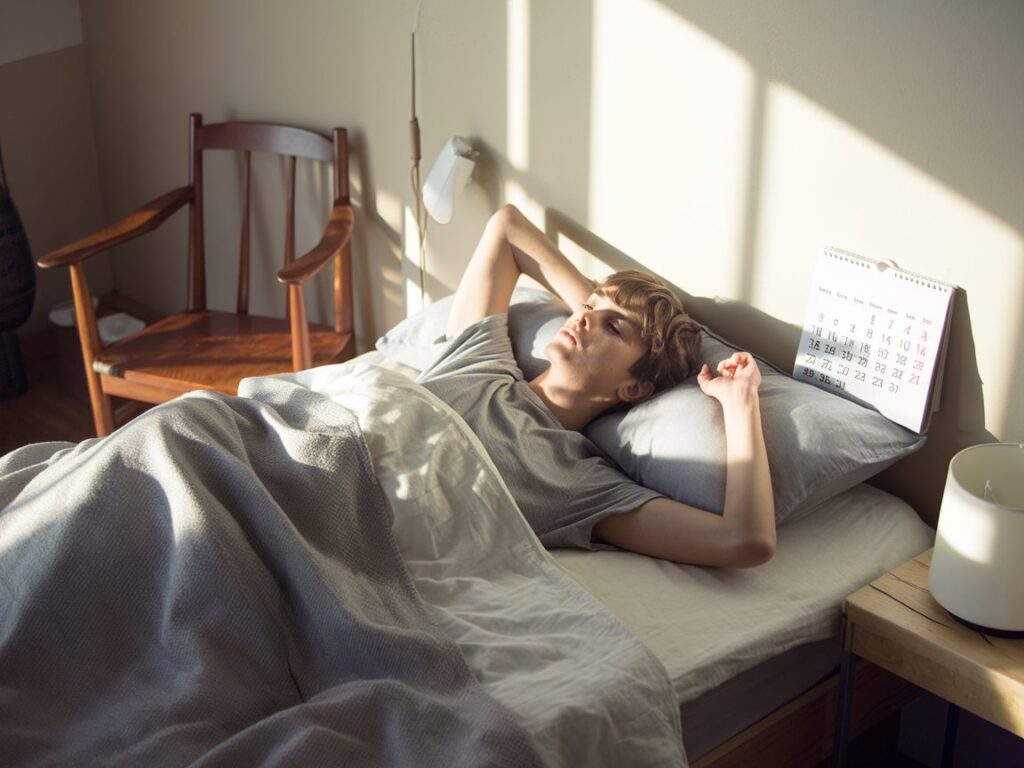
How Long Does It Take to Adjust to Waking Up Naturally?
When I first started trying to wake up early naturally, it wasn’t easy. It took about two weeks for my body to adjust. Everyone is different, but generally, it takes between one to three weeks for your body to fully adapt to waking up naturally.
The key is consistency. You can’t expect instant results, but if you stick to your new routine, your body will start to adjust, and eventually, you’ll wake up without needing an alarm.
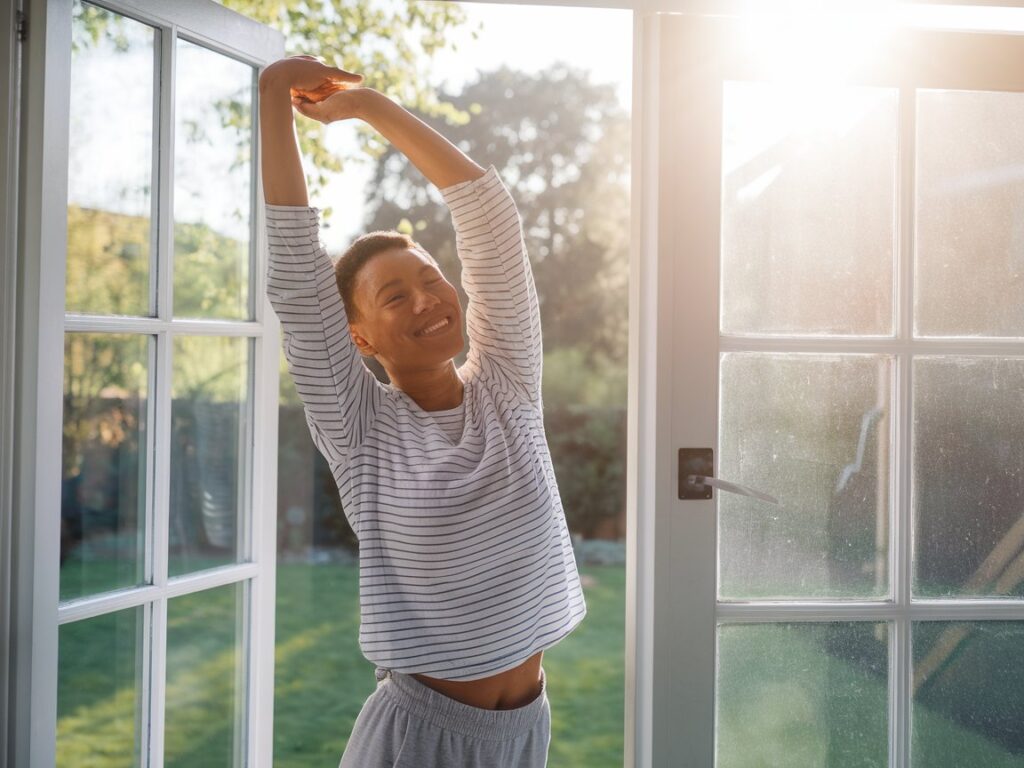
Can Waking Up Naturally Improve Overall Health and Wellbeing?
Yes! Waking up naturally can have a positive impact on your health. When your body follows its natural rhythm, you get better quality sleep, which leads to better overall wellbeing.
Since I started waking up without an alarm, I’ve noticed a huge improvement in my morning energy levels and mood.
Not only does waking up naturally improve your energy levels, but it also reduces stress. You no longer feel that rush of panic when your alarm goes off, and your mornings start off calm and peaceful.
My Journey to Waking Up Early Without an Alarm
When I first heard about waking up naturally, I didn’t believe it could work for me. I’ve always been a night owl, staying up late and struggling to wake up in the mornings. But once I started following these tips, everything changed.
The first few days were tough. I had to resist the temptation to grab my phone at night, and I had to stay consistent with my sleep schedule.
However, within a few weeks, I started seeing a noticeable change. I woke up feeling more refreshed, with more energy, and I didn’t even need my alarm anymore!
Now, I’m an early riser, and I feel so much better for it. Waking up naturally has improved my mood, energy, and overall quality of life.

FAQs About Wake Up Early Naturally
Key Takeaways
- Waking up without an alarm is achievable and can improve your day.
- Implementing healthy habits will help you wake up early naturally.
- Consistency is key when creating a natural wake-up routine.
Waking up early without an alarm may seem like a challenge at first, but with the right steps, you can make it happen.
It’s all about creating habits that support better sleep and understanding your body’s natural rhythm.
Soon, you’ll wake up feeling refreshed and ready to face the day—without the need for an alarm.
